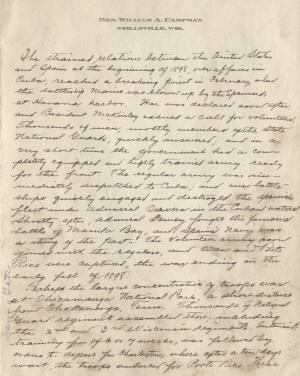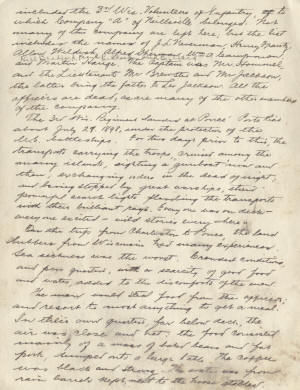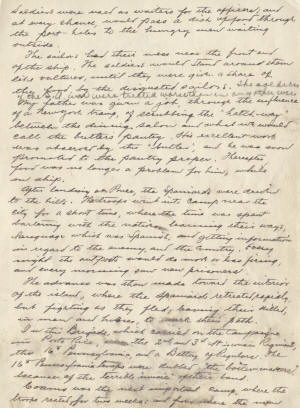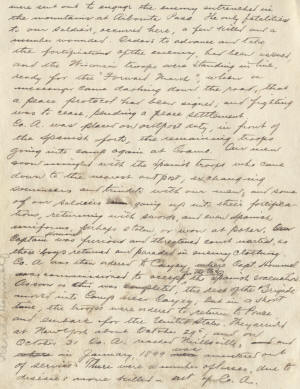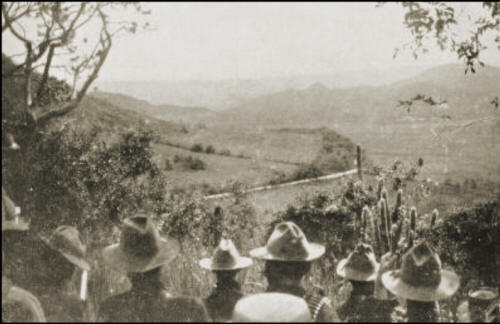Our Clark County, Wisconsin
SPANISH AMERICAN WAR VETERANS
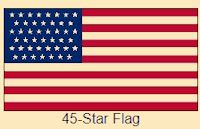
3rd Wisconsin Infantry
By Mrs. William Campman of Neillsville, Clark Co., Wisconsin
Transcribed by Dolores (Mohr) Kenyon.
|
Page 1 (Click Pages To Enlarge them. The transcription is below.) |
Page 2 |
|
Page 3 |
Page 4 |
Mrs. William A. Campman
Neillsville, Wis.
The strained relations between the United States and Spain at the beginning of 1898, over affairs in Cuba, reached a breaking point in February, when the battleship Main was blown up by the Spaniards at Havana harbor. War was declared soon after, and President McKinley issued a call for volunteers. Thousands of men mostly members of the State National Guards, quickly answered, and in a very short time the government had a completely equipped and highly trained army, ready for the front. The regular army was immediately dispatched to Cuba; and our battleships quickly engaged and destroyed the Spanish fleet under Admiral Cervera in the Cuban waters. Shortly after, Admiral Dewey fought the famous battle of Manila Bay, and Spain’s Navy was a string of the past. The Volunteer Army soon joined with the regulars, and Cuba and Porto Rico were captured, the war ending in the early fall of 1898.
Perhaps the largest concentration of troops was at Chicamauga National Park, a short distance from Chattanooga, Tenn. Thousands of National Guard regiment assembled there, including the 2nd and 3rd Wisconsin regiments. Intensive training for of 6 or 7 weeks was followed by orders to depart for Charleston, where after a ten days wait, the troops embarked for Porto Rico. These included the 3rd Wis. Volunteers of Infantry, to which Company “A” Neillsville belonged. Not many of this company are left here; but the list includes the names of J. L. Neverman, Henry Frantz, Allen Wildish, Alfred Sherman, Wm A Campman, and Martin Hauge. The Captain was Mr. Hommel, and the Lieutenant Mr. Brewster and Mr. Jackson, the latter being the father to Leo Jackson. All the officers are dead, as are many of the other members of the company.
The 3rd Wis. Regiment landed at Ponce’ Porto Rico about July 27, 1898, under the protection of the U. S. battleships. For two days prior to this, the transports carrying the troops cruised among the many islands, sighting a “gunboat” now and then; exchanging orders in the dead of night; and being stopped by great warships, their powerful, search lights flooding the transport with their brilliant rays. Everyone was on deck – everyone excited – wild stories everywhere--.
On the trip from Charleston to Ponce, the land lubbers from Wisconsin had many experiences. Sea sickness was the worst. Crowded conditions, and poor quarters, with a scarcity of good food and water, added to the discomforts of the men.
The men would steal food from the officers and resort to most anything to get a meal. In their own quarters, far below deck, the air was close and hot; the food consisted mainly of a mass of baked beans and fat pork, dumped onto a large table. The coffee was back and strong. The water was from rain barrels kept next to the horse stables. Soldiers were used as waiters for the officers; and at every chance would pass a dish of food through the port-holes to the hungry men waiting outside.
The sailors had their mess near the front end of the ship. The soldiers would stand around them like vultures, until they were given a share of the food by the disgusted sailors. The soldiers of the S. A. War were treated worse than in any other war.
My father was given a job, through the influence of a New York tramp, of scrubbing the “hatch-way” between the dining salon and what we would call the butler’s pantry. His excellent work was observed by the “butler”, and he was soon promoted to the pantry proper. Thereafter, food was no longer a problem for him, while on ship.
After landing at Ponce, the Spaniards were driven to the hills. The troops went into camp near the city for a short time, where the time was spent bartering with the natives, learning their ways, language which was Spanish, and getting information in regard to the enemy, and the country. Every night the out posts would do more or less firing, and every morning saw new prisoners.
The advance was then made toward the interior of the island, where the Spaniards retreated rapidly, but fighting as they fled, leaving their killed, in men and horse, to mark their path.
In this Brigade, which carried on the Campaign in Porto Rico, were the 2nd and 3rd Wisconsin Regiment, the 16th Pennsylvania and a Battery of Regulars. The 16th Pennsylvania troops were dubbed “the boiler-makers”, because of the terrible “music” of their band.
Coamo was the next important camp, where the troops rested, for two weeks; and from where the men were sent out to engage the enemy entrenched in the mountains at Aibonita Pass. The only fatalities to our soldiers, occurred here, a few killed and a number wounded. Orders to advance and take the fortifications of the enemy had been issued and the Wisconsin troops were standing in line, ready for the “Forward March,” when a messenger came dashing down the road, that a peace protocol had been signed; and fighting was to cease, pending a peace settlement.
Wis. 3rd Infantry just prior to entering Coamo.
Co. A. was placed on outpost duty, in front of the Spanish forts, the remaining troops going into camp again at Coamo. Our men soon mingled with the Spanish troops who came down to the nearest outpost exchanging souvenirs and trinkets with our men; and some of our soldiers even going up into their fortifications, returning with swords, and even Spanish uniforms, perhaps stolen or won at poker. Captain Hommel was furious and threatened court martial, as these boys returned and paraded in enemy clothing. Co. A. was then ordered to Cayey, where Capt. Hommel was commissioned to accept for the U. S. the Spanish evacuation. As soon as this was completed, the rest of the Brigade moved into Camp near Cayey, but in a short time, the troops were ordered to returned to Ponce and embark for the United States. They arrived at New York about October 29th; and on October 31, Co. A. reached Neillsville; and in January 1899 was mustered out of service. There were a number of losses, due to disease; none killed – out of Co. A.
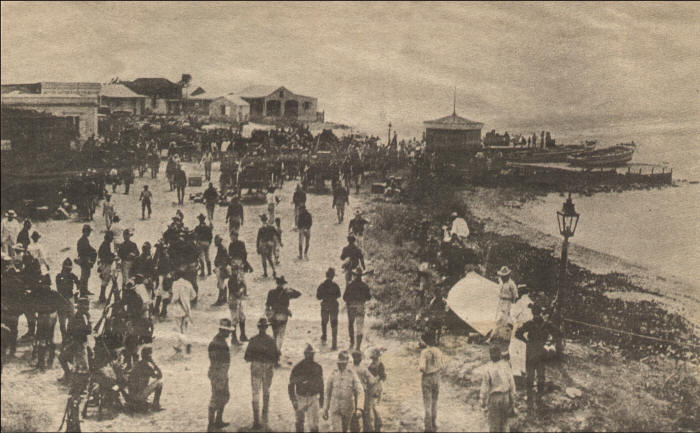
American Troops landing in Arroyo during the Spanish American War.
